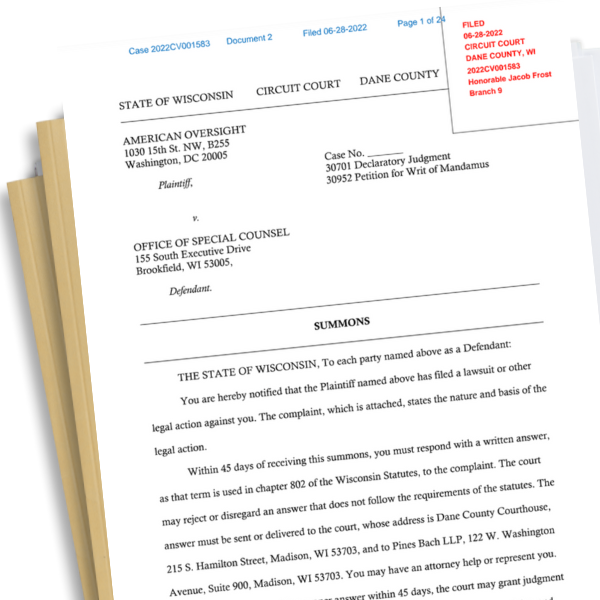
Wisconsin Court Grants Temporary Injunction, Confirms Office of Special Counsel Is Obligated to Retain Public Records
The court rejected OSC’s attempt to dismiss American Oversight’s lawsuit and granted a temporary injunction to prevent the further deletion of public records from OSC’s review of the 2020 election.

The Dane County Circuit Court on Monday denied the Wisconsin Office of Special Counsel’s (OSC) motions to dismiss American Oversight’s lawsuit asking the court to require OSC to retain its public records and to disclose records related to its discredited review of the 2020 election.
In the ruling, the court affirmed that OSC — and any future version of it — must comply with the state’s record retention laws. The court also granted a temporary injunction against any further deletion of records by the office, which despite being unstaffed is under the control of Assembly Speaker Robin Vos and still fighting in court to avoid transparency obligations.
American Oversight is represented by Democracy Forward Foundation and Pines Bach LLP.
The ruling — yet another instance in which a court in Wisconsin has rejected efforts of either Speaker Vos or OSC to avoid public accountability — came as part of American Oversight’s lawsuit to stop OSC from destroying public records in violation of the state’s public records retention law. Last year, the court granted a temporary restraining order barring the office from deleting records. In July 2022, OSC asked the court to dismiss the lawsuit, arguing that it was not subject to the retention law, among other claims that the court rejected.
Statement from Heather Sawyer, Executive Director at American Oversight:
“The court’s ruling again affirms Wisconsin’s strong commitment to transparent government. Court after court has upheld a key principle — that ‘representative government is dependent upon an informed electorate’ and that the people of Wisconsin are entitled to review the actions of public officials. No amount of denial, disorganization, or destruction changes the fact that OSC is subject to the same standards of transparency and open records as other government agencies, including the requirement not to destroy public documents.”
Statement from Rachel Fried, Senior Counsel at Democracy Forward:
“Today’s ruling is a victory for democracy that affirms what we’ve been arguing all along: Wisconsin’s Office of Special Counsel is a state agency and must follow Wisconsin’s public records retention laws. Today’s ruling reaffirms Wisconsin’s rich tradition of recognizing public transparency and an informed electorate as pillars of democracy.”
In the ruling, Judge Jacob B. Frost wrote that OSC had “throw[n] a variety of arguments against the wall to try to avoid the Retention Law” and that those arguments “all fail,” adding that the “right to review government records is, for all practical purposes, meaningless if government agencies are not required to preserve records long enough for parties to request review.” American Oversight’s litigation previously revealed that OSC had routinely deleted records it deemed “not of use” to the election inquiry.
Despite indications that the investigation has been closed since last summer’s firing of attorney Michael Gableman, who headed the OSC investigation, Vos has continued to authorize the legal costs for OSC’s ongoing fight to oppose the release and proper maintenance of public records. Moreover, Vos has never admitted the central basis of this lawsuit, which is that OSC was and would continue to be subject to the state’s public records retention law. Importantly, and as recognized by the court in its ruling on Monday, OSC could be restaffed at any time — either to continue its sham investigation into the 2020 election or to pursue similar partisan inquiries in the future.
“[T]he public interest in the OSC preserving all its records investigating the 2020 election and in being able to request and review those records is paramount,” wrote Judge Frost in his decision. Monday’s ruling affirms that any future actions by OSC would be subject to the same requirements for the preservation and disclosure of public records. This precedent strengthens Wisconsin public records law, and ensures that OSC will conduct any future work transparently.
Investigation and Litigation Background
In 2021, Vos created OSC to “investigate” the results of the 2020 presidential election, even though the results were not in doubt and there have been no credible allegations of fraud or misconduct that could have affected the outcome.
In June 2021, one day after facing criticism from former President Trump for not having launched an Arizona-style “audit” of Wisconsin’s election results, Vos announced that he had appointed Michael Gableman — a conservative attorney and former state Supreme Court justice who had said the election had been stolen — to lead the inquiry.
American Oversight launched an investigation to shed light on the inquiry, resulting in the release of thousands of pages of related public records as well as multiple court rulings affirming that the Office of Special Counsel, which had been created to conduct the review, was subject to Wisconsin’s Open Records Law. More information on findings from those records is available here.
Through the litigation, American Oversight also learned that OSC had routinely deleted documents it deemed “not of use to the investigation.” During a hearing in a separate lawsuit brought by American Oversight, Gableman testified that he had deleted records from the early months of his review, stating: “Did I delete documents? Yes, I did.”
In June 2022, American Oversight, represented by Democracy Forward and Pines Bach LLP, filed this lawsuit against OSC, seeking an emergency order to stop the office from destroying records in violation of the state’s public records retention law.
On July 5, 2022, a Dane County Circuit Court judge granted a temporary restraining order preventing OSC from deleting public records. OSC asked the court to dismiss American Oversight’s claims, arguing that the office was not subject to the retention law and stating that all records in its possession had been provided to the Assembly. Despite assurances that all OSC’s records would be published online, that has not occurred.